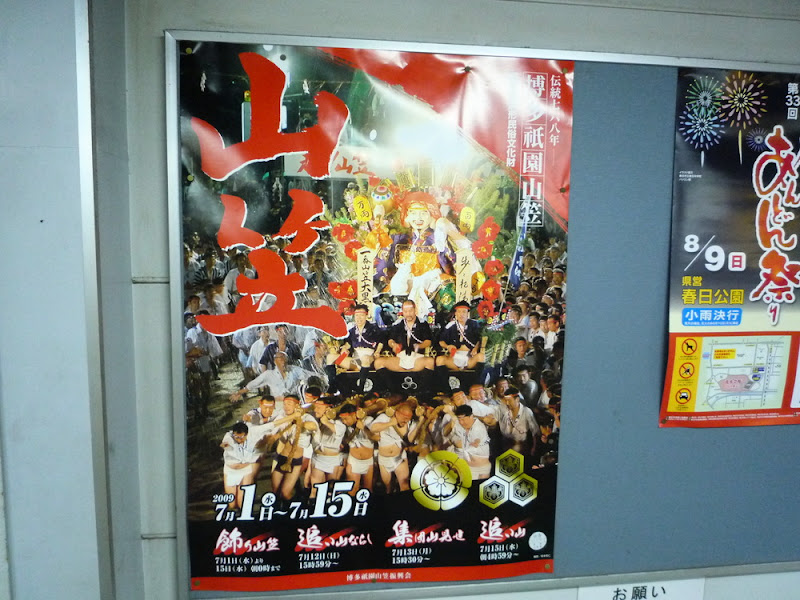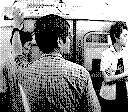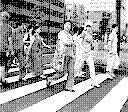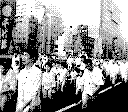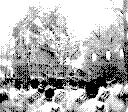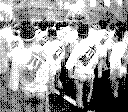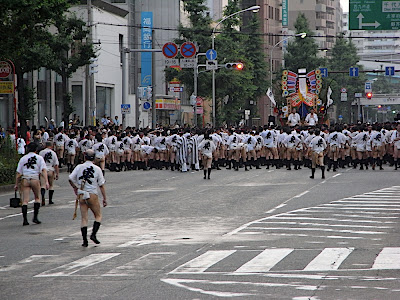
Hakata Gion Yamakasa es junto con Dontaku uno de los dos grandes festivales de la ciudad de Fukuoka. Consiste en hombres llevando palanquines cargados de ofrendas, un poco parecidos a los pasos de semana santa. El festival empezó hace una semana pero el clímax y cierre ha sido esta mañana de madrugada.
博多祇園山笠はどんたくと並び福岡の大きな祭の一つ。特長は男たちが運ぶ、「山」という御神輿に近いもの。一週間ぐらいのスケジュールは15日の夜明け、この追い山で終わった。
Hakata Gion Yamakasa is one of the two big festivals of Fukuoka, along with Dontaku. It consists on men carrying offerings on platforms. The festival started a week ago, but the climax closing event was early this morning.
[YouTube | blip.tv | download MP4]
En este festival se pueden ver culos de todo tipo. Puedes ver culos de niño, culos de directivo de empresa, culos de viejo… Lo que quieras menos culos de mujer. En cambio en Japón hay más pudor que en España a la hora de que los hombres muestren el pecho o los genitales, de hecho creo que es ilegal en público lo que sería curioso porque el cuerpo humano es lo más natural que tenemos. Por cierto, hasta 1898 los hombres iban con el torso desnudo al Yamakasa.
この祭で見れるものといったら、お尻。こどものお尻、課長のお尻、お年寄りのお尻・・・女性のお尻以外、お尻の種類は全部見物できる。日本ではこういう場合お尻を露出してもいいが、男の乳首とおチンチンを外で露出するのは違法な気がする。人間の体は自然な物だから「見せるな」と言われたら悲しく思う。ちなみに山笠には男は西暦1898年まで締め込みだけで出てたらしい。
One thing you can enjoy at this festival is seeing every kind of bottom you can imagine. Children bottoms, executive bottoms, old man bottoms… Whatever except for women bottoms. But in Japan they are more puritan than in Spain about men showing their nipples or sexual organs. I think it’s even illegal in public, what would be very particular since our body is the most natural thing we have. By the way men were going top-less to Yamakasa until 1898.
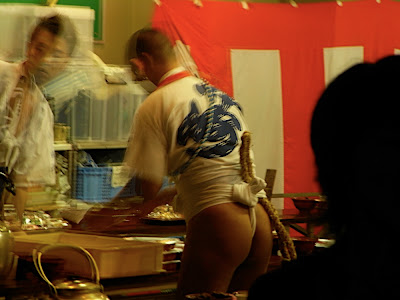
El festival lo organiza el templo sintoísta Kushida Jinja, situado en el barrio de Gion, a distancia de un paseo desde las estaciones de Tenjin o Hakata. A las 4 de la mañana el templo estaba lleno de gente y de yatai (puestos) de comida y juegos de feria.
この祭を主催するのは祇園の櫛田神社。天神からも博多駅からも散歩距離だ。4時に行ったら神社は屋台と人でいっぱいだった。
This festival is organized by a Shinto shrine at Gion called Kushida Jinja. You can walk there from Tenjin or Hakata Station but it will take a while. At 4 am, the shrine was filled with people and yatai (food stalls).
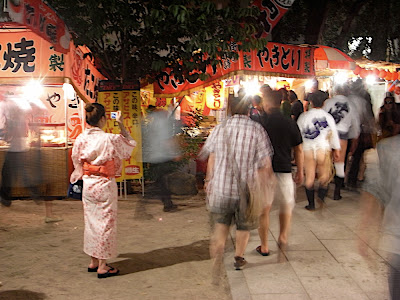
En el templo vi a este pequeño costalero. No era el más joven ataviado con el atuendo reglamentario pero sí el más pequeño que vi que sabía caminar. Era la primera vez que iba al Yamakasa, igual que yo. Pero yo solo fui a mirar y este chavalote vino a enseñar el culo como hombre Fukuokero que es. ¡Qué guapo eres! (Del culo no hice fotos para que no me acusen de pornografía infantil.)
神社ではこの小さな舁き手に会った。一番小さいのじゃなかったけど、歩ける人の中で一番小さかったかな。僕と同じく、初山笠らしい。僕は行ったのは見物のためだけだが、この子は福岡男子としてちゃんとお尻を見せにきた!男前!かっけー!(児童ポルノで疑われたくないから後ろ姿は撮っていない)
At the shrine I met this small festival-goer. He wasn’t the smallest guy I saw but he’s the smallest I saw that could actually walk. It was his first Yamakasa. Same for me but I was only watching while he was showing his bottom like a good Fukuoka man. Cool! Cute! (I took no pictures of his behind so that I’m not charged with child porn.)
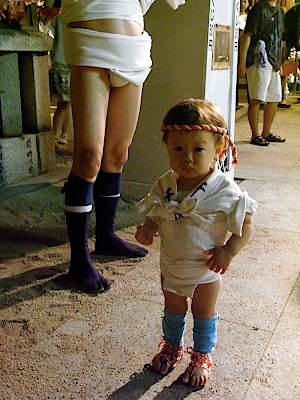
Los capitanes que iban subidos en el primer palanquín, esperando a que les den la salida a las 5 de la mañana.
5時のスタート合図を待つ一番山の台上がり。
The leaders on the first platform wait for the start sign at 5 am.
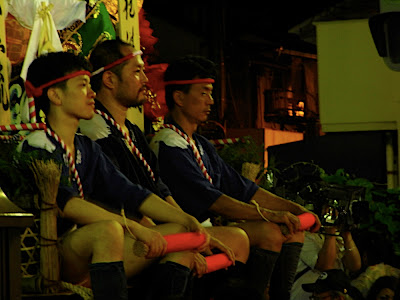
El segundo palanquín en la posición de salida junto al templo Kushida. Imposible dar un paso y muy difícil hacer fotos porque todo el mundo empujaba.
櫛田神社の外でスタート合図を待つ二番山。人が歩けないぐらいに多かった。撮影も大変だった。
The second platform ready and set outside the Kushida Shrine. It was impossible to walk because of the crowd, and taking pictures was very hard.

Los palanquines están cargados de ofrendas para Susano, el dios del mar y las tormentas. ¡Arre, caballo!
舁き山もこの祭全体はスサノオを祭る。ヒヒーン!
The platforms carry offerings to Susano, god of the sea and the storms.

En el Yamakasa se refrescan con mucha agua. Recuerda un poco a las Hogueras de San Juan, y no me pude resistir a cantar un par de veces el clásico «bombero, cabrón, hijo puta maricón». (Con todo mi respeto hacia los bomberos, las prostitutas, sus hijos, y los homosexuales.)
暑いから山笠でよく見るのは参加者に水をかける。このところは地元のアリカンテ火祭りと一緒だ。
They throw a lot of water on the guys to refresh them. That reminds me of the San Juan bonfires festival at my hometown Alicante.
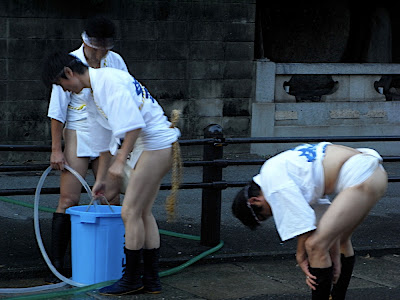
Había yatai por todas partes. Algunos de ellos están a diario (en Fukuoka es muy típico) y otros están solo esta semana por ser la fiesta que es.
屋台はどこにもあった。毎日やってるのもあり、このお祭りだからここでやってるのもあった。
There were food stalls everywhere. Some of them are there everyday (it’s very typical in Fukuoka) and some are there only for the festival week.
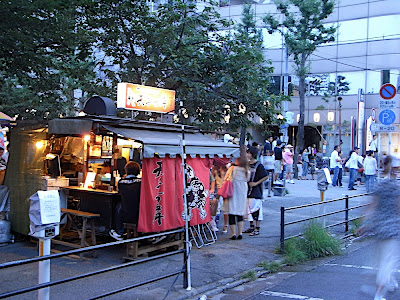
Es difícil decir si este señor está solo descansando un rato o lleva toda la noche sentado aquí.
休憩してるだけか昨日の夜からずっと座ってるか、よくわからない。両方あり得る。
It’s hard to say wether this man is having a break here or he’s been sitting there since last night. Both are possible.
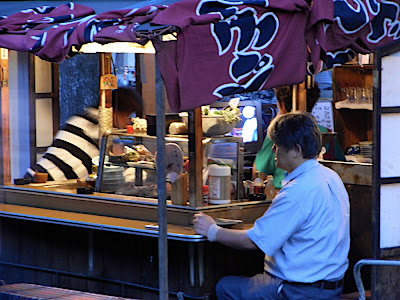
Los japoneses no suelen tener vello visible en el culo. Spoiler: los españoles sí.
日本の男性は普通はお尻に派手な毛が生えないけど、スペインの男はお尻に胸毛みたいなのが生える。情熱の国である結果の一つかな?
Japanese men don’t usually grow visible hair on their bottoms. Spoiler: Spanish men do.

El desfile es en realidad una carrera y cada 5 minutos sale un equipo corriendo con su palanquín. Empieza de noche y termina de día.
追い山というのは本当はレースみたいなもので、5分おきに山が走り出す。始まる時はまだ暗いけど、終わったら普通に朝だ。
This event is actually a race and every 5 minutes one team starts running with their platform. It starts at night and ends in the morning.
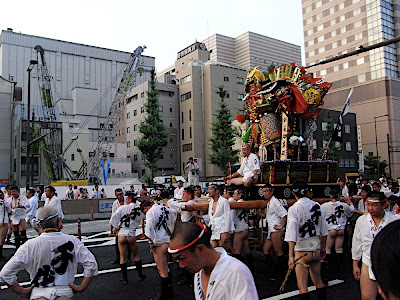
De estar sentado también se puede cansar uno.
座るだけでも疲れることですね。わかります。
One can also get tired just of being sitted.

Gente del equipo del primer palanquín, esperando a que vuelva.
一番山の帰りを待つ参加者。
First platform’s teammates waiting for the platform to return.
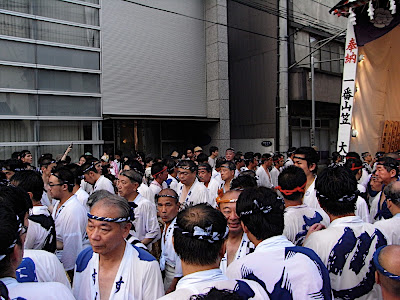
Los tambores anuncian la llegada del palanquín y sus capitanes para cerrar la ceremonia.
太鼓が予告する山と台上がりの帰り。
The drums announce the platform and the leaders’ coming.

El palanquín aparcando en su «barraca».
屋根の下で「駐山」する山。
The platform being «parked» in its «hangar».
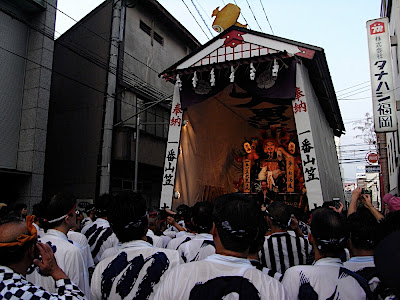
El jefe se quita la cinta de la cabeza y todos los participantes también se la quitan a la vez.
リーダーが「てのごい」を外すと、みんなも一緒に外す。
The leader takes his hairband and so does everyone.

Los capitanes, que os deberían sonar porque salieron en una de las primeras fotos, hacen el último saludo y todos los participantes repiten las consignas por última vez hasta el año que viene.
上の方の写真にも出ていた一番山の台上がりが最後の挨拶をする。また来年!
You should recognize the leaders from one of the pictures above. Here they say the last greetings and people repeat their slogans for the last time until next year.
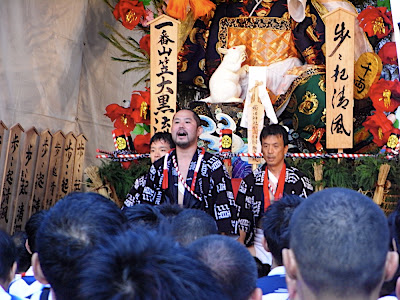
He ido solo pero la gente es muy amable y me lo he pasado muy bien. Si puede ser el año que viene también estaré allí. ¡Oisa! ¡Oisa!
一人で行ったけど優しい皆さんのおかげで満喫できた。可能な限り来年も行くぜ!オイサ!オイサ!
I went alone but had a great time thanks to the people being very kind. I will be there next year too if possible. Oisa! Oisa!


